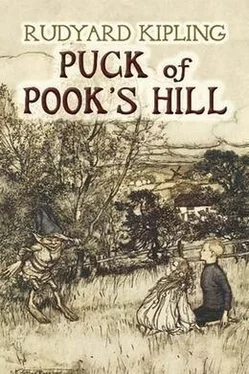Rudyard Kipling - Puck of Pook's Hill
Здесь есть возможность читать онлайн «Rudyard Kipling - Puck of Pook's Hill» весь текст электронной книги совершенно бесплатно (целиком полную версию без сокращений). В некоторых случаях можно слушать аудио, скачать через торрент в формате fb2 и присутствует краткое содержание. Год выпуска: 2014, Издательство: epubBooks Classics, Жанр: Фэнтези, на английском языке. Описание произведения, (предисловие) а так же отзывы посетителей доступны на портале библиотеки ЛибКат.
- Название:Puck of Pook's Hill
- Автор:
- Издательство:epubBooks Classics
- Жанр:
- Год:2014
- ISBN:нет данных
- Рейтинг книги:3 / 5. Голосов: 1
-
Избранное:Добавить в избранное
- Отзывы:
-
Ваша оценка:
- 60
- 1
- 2
- 3
- 4
- 5
Puck of Pook's Hill: краткое содержание, описание и аннотация
Предлагаем к чтению аннотацию, описание, краткое содержание или предисловие (зависит от того, что написал сам автор книги «Puck of Pook's Hill»). Если вы не нашли необходимую информацию о книге — напишите в комментариях, мы постараемся отыскать её.
Puck of Pook's Hill — читать онлайн бесплатно полную книгу (весь текст) целиком
Ниже представлен текст книги, разбитый по страницам. Система сохранения места последней прочитанной страницы, позволяет с удобством читать онлайн бесплатно книгу «Puck of Pook's Hill», без необходимости каждый раз заново искать на чём Вы остановились. Поставьте закладку, и сможете в любой момент перейти на страницу, на которой закончили чтение.
Интервал:
Закладка:
'Yes,' said Dan, 'barring the very long words.'
'Wonderful! Read to me, that I may hear for myself.'
Dan flushed, but opened the book and began—gabbling a little—at 'The Discoverer of the North Cape.'
'Othere, the old sea–captain, Who dwelt in Helgoland, To King Alfred, the lover of truth, Brought a snow–white walrus tooth, That he held in his brown right hand.'
'But—but—this I know! This is an old song! This I have heard sung! This is a miracle,' Sir Richard interrupted. 'Nay, do not stop!' He leaned forward, and the shadows of the leaves slipped and slid upon his chain–mail.
'"I ploughed the land with horses, But my heart was ill at ease, For the old sea–faring men Came to me now and then With their Sagas of the Seas."'
His hand fell on the hilt of the great sword. 'This is truth,' he cried, 'for so did it happen to me,' and he beat time delightedly to the tramp of verse after verse.
'"And now the land," said Othere, "Bent southward suddenly, And I followed the curving shore, And ever southward bore Into a nameless sea."'
'A nameless sea!' he repeated. 'So did I—so did Hugh and I.'
'Where did you go? Tell us,' said Una.
'Wait. Let me hear all first.' So Dan read to the poem's very end.
'Good,' said the knight. 'That is Othere's tale—even as I have heard the men in the Dane ships sing it. Not in those same valiant words, but something like to them.'
'Have you ever explored North?' Dan shut the book.
'Nay. My venture was South. Farther South than any man has fared, Hugh and I went down with Witta and his heathen.' He jerked the tall sword forward, and leaned on it with both hands; but his eyes looked long past them.
'I thought you always lived here,' said Una, timidly.
'Yes; while my Lady Ælueva lived. But she died. She died. Then, my eldest son being a man, I asked De Aquila's leave that he should hold the Manor while I went on some journey or pilgrimage—to forget. De Aquila, whom the Second William had made Warden of Pevensey in Earl Mortain's place, was very old then, but still he rode his tall, roan horses, and in the saddle he looked like a little white falcon. When Hugh, at Dallington, over yonder, heard what I did, he sent for my second son, whom being unmarried he had ever looked upon as his own child, and, by De Aquila's leave, gave him the Manor of Dallington to hold till he should return. Then Hugh came with me.'
'When did this happen?' said Dan.
'That I can answer to the very day, for as we rode with De Aquila by Pevensey—have I said that he was Lord of Pevensey and of the Honour of the Eagle?—to the Bordeaux ship that fetched him his wines yearly out of France, a Marsh man ran to us crying that he had seen a great black goat which bore on his back the body of the King, and that the goat had spoken to him. On that same day Red William our King, the Conqueror's son, died of a secret arrow while he hunted in a forest. "This is a cross matter," said De Aquila, "to meet on the threshold of a journey. If Red William be dead I may have to fight for my lands. Wait a little."
'My Lady being dead, I cared nothing for signs and omens, nor Hugh either. We took that wine–ship to go to Bordeaux; but the wind failed while we were yet in sight of Pevensey, a thick mist hid us, and we drifted with the tide along the cliffs to the west. Our company was, for the most part, merchants returning to France, and we were laden with wool and there were three couple of tall hunting–dogs chained to the rail. Their master was a knight of Artois. His name I never learned, but his shield bore gold pieces on a red ground, and he limped, much as I do, from a wound which he had got in his youth at Mantes siege. He served the Duke of Burgundy against the Moors in Spain, and was returning to that war with his dogs. He sang us strange Moorish songs that first night, and half persuaded us to go with him. I was on pilgrimage to forget—which is what no pilgrimage brings. I think I would have gone, but …
'Look you how the life and fortune of man changes! Towards morning a Dane ship, rowing silently, struck against us in the mist, and while we rolled hither and yon Hugh, leaning over the rail, fell outboard. I leaped after him, and we two tumbled aboard the Dane, and were caught and bound ere we could rise. Our own ship was swallowed up in the mist. I judge the Knight of the Gold Pieces muzzled his dogs with his cloak, lest they should give tongue and betray the merchants, for I heard their baying suddenly stop.
'We lay bound among the benches till morning, when the Danes dragged us to the high deck by the steering–place, and their captain—Witta, he was called—turned us over with his foot. Bracelets of gold from elbow to armpit he wore, and his red hair was long as a woman's, and came down in plaited locks on his shoulder. He was stout, with bowed legs and long arms. He spoiled us of all we had, but when he laid hand on Hugh's sword and saw the runes on the blade hastily he thrust it back. Yet his covetousness overcame him and he tried again and again, and the third time the Sword sang loud and angrily, so that the rowers leaned on their oars to listen. Here they all spoke together, screaming like gulls, and a Yellow Man, such as I have never seen, came to the high deck and cut our bonds. He was yellow—not from sickness, but by nature—yellow as honey, and his eyes stood endwise in his head.'
'How do you mean?' said Una, her chin on her hand.
'Thus,' said Sir Richard. He put a finger to the corner of each eye, and pushed it up till his eyes narrowed to slits.
'Why, you look just like a Chinaman!' cried Dan. 'Was the man a Chinaman?'
'I know not what that may be. Witta had found him half dead among ice on the shores of Muscovy. We thought he was a devil. He crawled before us and brought food in a silver dish which these sea–wolves had robbed from some rich abbey, and Witta with his own hands gave us wine. He spoke a little in French, a little in South Saxon, and much in the Northman's tongue. We asked him to set us ashore, promising to pay him better ransom than he would get price if he sold us to the Moors—as once befell a knight of my acquaintance sailing from Flushing.
'"Not by my father Guthrum's head," said he. "The Gods sent ye into my ship for a luck–offering."
'At this I quaked, for I knew it was still the Danes' custom to sacrifice captives to their Gods for fair weather.
'"A plague on thy four long bones!" said Hugh. "What profit canst thou make of poor old pilgrims that can neither work nor fight?"
'"Gods forbid I should fight against thee, poor Pilgrim with the Singing Sword," said he. "Come with us and be poor no more. Thy teeth are far apart, which is a sure sign thou wilt travel and grow rich."
'"What if we will not come?" said Hugh.
'"Swim to England or France," said Witta. "We are midway between the two. Unless ye choose to drown yourselves no hair of your head will be harmed here aboard. We think ye bring us luck, and I myself know the runes on that Sword are good." He turned and bade them hoist sail.
'Hereafter all made way for us as we walked about the ship, and the ship was full of wonders.'
'What was she like?' said Dan.
'Long, low, and narrow, bearing one mast with a red sail, and rowed by fifteen oars a–side,' the knight answered. 'At her bows was a deck under which men might lie, and at her stern another shut off by a painted door from the rowers' benches. Here Hugh and I slept, with Witta and the Yellow Man, upon tapestries as soft as wool. I remember'—he laughed to himself—'when first we entered there a loud voice cried, "Out swords! Out swords! Kill, kill!" Seeing us start Witta laughed, and showed us it was but a great–beaked grey bird with a red tail. He sat her on his shoulder, and she called for bread and wine hoarsely, and prayed him to kiss her. Yet she was no more than a silly bird. But—ye knew this?' He looked at their smiling faces.
Читать дальшеИнтервал:
Закладка:
Похожие книги на «Puck of Pook's Hill»
Представляем Вашему вниманию похожие книги на «Puck of Pook's Hill» списком для выбора. Мы отобрали схожую по названию и смыслу литературу в надежде предоставить читателям больше вариантов отыскать новые, интересные, ещё непрочитанные произведения.
Обсуждение, отзывы о книге «Puck of Pook's Hill» и просто собственные мнения читателей. Оставьте ваши комментарии, напишите, что Вы думаете о произведении, его смысле или главных героях. Укажите что конкретно понравилось, а что нет, и почему Вы так считаете.












